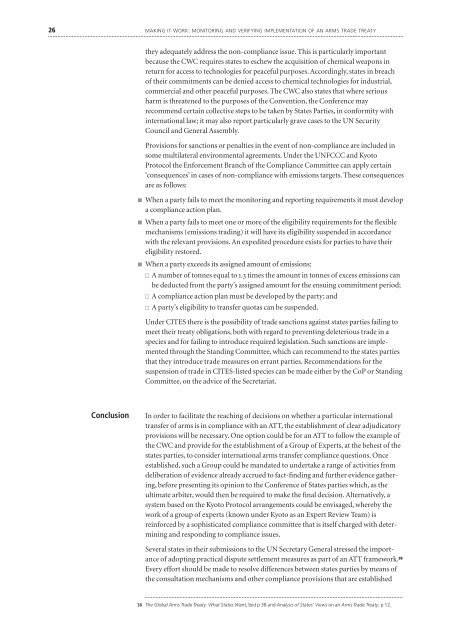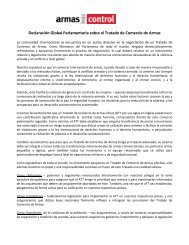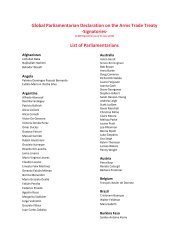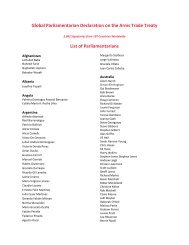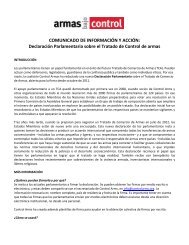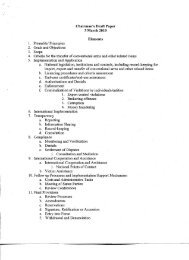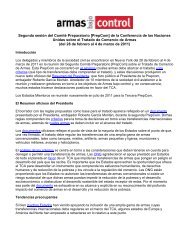Making it Work - Control Arms
Making it Work - Control Arms
Making it Work - Control Arms
- No tags were found...
Create successful ePaper yourself
Turn your PDF publications into a flip-book with our unique Google optimized e-Paper software.
26 MAKING IT WORK: MONITORING AND VERIFYING IMPLEMENTATION OF AN ARMS TRADE TREATYthey adequately address the non-compliance issue. This is particularly importantbecause the CWC requires states to eschew the acquis<strong>it</strong>ion of chemical weapons inreturn for access to technologies for peaceful purposes. Accordingly, states in breachof their comm<strong>it</strong>ments can be denied access to chemical technologies for industrial,commercial and other peaceful purposes. The CWC also states that where seriousharm is threatened to the purposes of the Convention, the Conference mayrecommend certain collective steps to be taken by States Parties, in conform<strong>it</strong>y w<strong>it</strong>hinternational law; <strong>it</strong> may also report particularly grave cases to the UN Secur<strong>it</strong>yCouncil and General Assembly.Provisions for sanctions or penalties in the event of non-compliance are included insome multilateral environmental agreements. Under the UNFCCC and KyotoProtocol the Enforcement Branch of the Compliance Comm<strong>it</strong>tee can apply certain‘consequences’ in cases of non-compliance w<strong>it</strong>h emissions targets. These consequencesare as follows:■ When a party fails to meet the mon<strong>it</strong>oring and reporting requirements <strong>it</strong> must developa compliance action plan.■ When a party fails to meet one or more of the eligibil<strong>it</strong>y requirements for the flexiblemechanisms (emissions trading) <strong>it</strong> will have <strong>it</strong>s eligibil<strong>it</strong>y suspended in accordancew<strong>it</strong>h the relevant provisions. An exped<strong>it</strong>ed procedure exists for parties to have theireligibil<strong>it</strong>y restored.■ When a party exceeds <strong>it</strong>s assigned amount of emissions:■ A number of tonnes equal to 1.3 times the amount in tonnes of excess emissions canbe deducted from the party’s assigned amount for the ensuing comm<strong>it</strong>ment period;■ A compliance action plan must be developed by the party; and■ A party’s eligibil<strong>it</strong>y to transfer quotas can be suspended.Under CITES there is the possibil<strong>it</strong>y of trade sanctions against states parties failing tomeet their treaty obligations, both w<strong>it</strong>h regard to preventing deleterious trade in aspecies and for failing to introduce required legislation. Such sanctions are implementedthrough the Standing Comm<strong>it</strong>tee, which can recommend to the states partiesthat they introduce trade measures on errant parties. Recommendations for thesuspension of trade in CITES-listed species can be made e<strong>it</strong>her by the CoP or StandingComm<strong>it</strong>tee, on the advice of the Secretariat.ConclusionIn order to facil<strong>it</strong>ate the reaching of decisions on whether a particular internationaltransfer of arms is in compliance w<strong>it</strong>h an ATT, the establishment of clear adjudicatoryprovisions will be necessary. One option could be for an ATT to follow the example ofthe CWC and provide for the establishment of a Group of Experts, at the behest of thestates parties, to consider international arms transfer compliance questions. Onceestablished, such a Group could be mandated to undertake a range of activ<strong>it</strong>ies fromdeliberation of evidence already accrued to fact-finding and further evidence gathering,before presenting <strong>it</strong>s opinion to the Conference of States parties which, as theultimate arb<strong>it</strong>er, would then be required to make the final decision. Alternatively, asystem based on the Kyoto Protocol arrangements could be envisaged, whereby thework of a group of experts (known under Kyoto as an Expert Review Team) isreinforced by a sophisticated compliance comm<strong>it</strong>tee that is <strong>it</strong>self charged w<strong>it</strong>h determiningand responding to compliance issues.Several states in their submissions to the UN Secretary General stressed the importanceof adopting practical dispute settlement measures as part of an ATT framework. 38Every effort should be made to resolve differences between states parties by means ofthe consultation mechanisms and other compliance provisions that are established38 The Global <strong>Arms</strong> Trade Treaty: What States Want, Ibid p 38 and Analysis of States’ Views on an <strong>Arms</strong> Trade Treaty, p 12.


